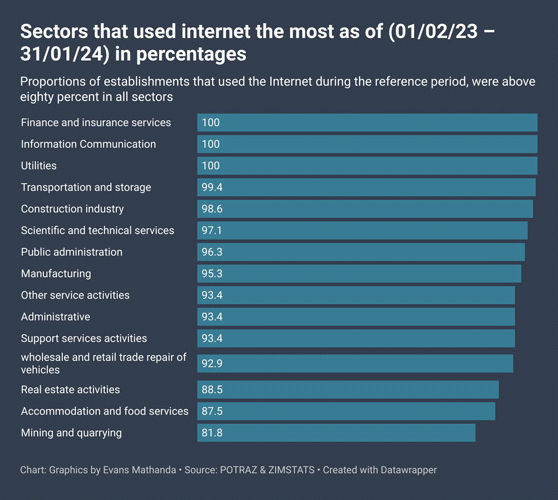
DATA analysis has unearthed an impressive increase of access to Information and Communication Technology (ICT) and its usage by businesses in Zimbabwe from 2023 to 2024, a survey obtained exclusively by The Standard has revealed.
According to the survey that was done by the Postal and Telecommunications Regulatory Authority of Zimbabwe (Potraz) in partnership with the Zimbabwe National Statistics Agency (Zimstats), overall, 94.2% of the institutions used the internet.
The survey was a development to unearth the importance of businesses in the achievement of national, regional and international ICT strategic goals. This is the second survey after the first one that was done in 2009, conducted to assist in the monitoring and evaluation of modernising the economy through use of ICTs and digital technology.
The data shows the activities performed by institutions via the Internet. 62.1% for receiving orders whilst 59.8% was for placing orders. 94.8% was for sending or receiving e-mail whereas 88.4% was for social media usage. Seventy-three percent was for getting information about goods or services, customers and suppliers.
Tabled data also shows that finance and insurance services, ICT and utilities used the internet 100% whereas transportation and storage used 99.4%, which is slightly below the above mentioned. Construction industry used the internet 98.6% while professional, scientific and technical services used 97.1%. Public administration seats at 96.3% while manufacturing was at 95.3% on internet usage, according to the survey.
Support services and other activities were all pegged at 93.4% while wholesale and retail trade repair of vehicles used 92.9% of the internet. Real estate activities used 88.5% whereas accommodation and food services used 87.5%. Mining and quarrying were the least, which used 81.8% of the internet. Proportions of establishments that used the internet during the period of 2023 and 2024 were above 80% in all sectors. Scrutiny of data revealed an interesting increase in the usage of the internet by these institutions.
A 24.1% point increase of establishments with web presence was noted, from 32.0% in 2009 to 56.1% in 2024.
Sevent-two point five percent accessed the internet via fixed wired broadband network while 35.3% testified connecting to the internet using Mobile Cellular Broadband Network via a handset. 12.4% had mobile narrowband network.
- Crime tech: Technology can eradicate corruption
- Courier services under threat: Minister
- Banks should reduce exorbitant charges
- Let’s raise awareness about cybercrimes
Keep Reading
Zimbabwe is currently ranked at number 23 out of 47 African countries in ICT development, according to the latest report from the International Telecommunication Union (ITU).
In an interview, ICT and Courier Services minister Tatenda Mavetera said the survey unearthed 88.4% usage of social media by businesses, which included financial institutions. She reiterated that the statistics should also translate to good service delivery and customer care services across all business sectors.

“The impressive increase of ICTs and social media usage by businesses for the year 2023 and 2024 signals significant progress for Zimbabwe’s ICT sector. When businesses increasingly adopt ICTs, it also boosts productivity, efficiency and also competitiveness,” she said.
“If we continue like this, businesses will be able to contribute towards the overall economic growth. Enhancing the access to ICTs also enables businesses to explore new markets outside Zimbabwe and improve operations. When we look at digital transformation as well, it really shows that companies are also embracing digital transformation through communication.
"I have seen improvements in the adoption of e-commerce by businesses as this entails that we are seeing an improvement in terms of service delivery in Zimbabwe. We have to make sure that we work towards having more enhanced opportunities for new technology even for businesses in remote areas so that even at growth points, they have access to ICTs. When more businesses adopt the use of ICTs, then that means there will be demand for better internet and mobile network infrastructure.”
To validate the data presented by Potraz in partnership with Zimstats, The Standard carried out a survey across all Alpha Media Holdings digital platforms to assess the effectiveness of digital platforms in customer care services provided by financial institutions.
According to the survey, 46.7% confirmed to have used a digital customer service platform to lodge a query to the service providers and their complaints were successfully resolved online. However, 40% claimed that their lodged queries were not addressed online while 13.3% of the complaints were partially resolved online.
Jacob Mutisi, chief executive officer at Hansole Investments and chairperson of Zimbabwe Information and Communication Technology said the increased use of digital platforms for communication among businesses directly translates to better customer care service and increased interactions.
“With 88.4% of businesses utilising these platforms, customers can receive real-time responses to inquiries and concerns, enhancing overall engagement. Social media facilitates direct interaction allowing businesses to address issues promptly and tailor their responses to individual needs. It serves as an effective feedback mechanism enabling companies to gather insights and adapt their offerings based on customer preferences. This communication channel ultimately fosters a more responsive and customer centric service environment” he said.
“The increased adoption of Information and Communication Technology among businesses opens up a lot of new opportunities for technology providers, including software and hardware companies. This trend is likely to stimulate further investment in ICT infrastructure, enhancing connectivity across the country. Moreover, as businesses embrace digital tools, the demand for skilled professionals in areas such as digital marketing, ICT support and data analysis will rise. This landscape fosters innovation and competition, ultimately contributing to the overall development and diversification of Zimbabwe’s economy”
CBZ Holdings group chief marketing and corporate affairs officer Matilda Nyathi told The Standard in an interview they usually receive from 150 to 300 queries per day though figures might change according to days of the month.
“Resolution time averages 72 hours, however, it all depends on the type of query and if there are third parties involved the time stretches. Response time varies from 30 minutes or within 24 hours,” said Nyathi.
The Nedbank Contact Centre said their social media platforms are integrated on Hootsuite, hence 75% of enquiries are resolved at first contact while the remaining 25% are resolved within a Service Level Agreement of 48 hours. Nedbank receives an average of 120 inquiries per day and they address an inquiry in 10 minutes.
CBZ has about 159 000 followers on Facebook and 42 000 followers on X whereas Nedbank has 106 000 followers on Facebook and 12 000 followers on X.
Harare Institute of Technology (HIT) student Tanaka Chuma, who is currently studying towards a Bachelor’s Degree in Computer Science, said that the government should also avail infrastructure to improve household internet access and use of ICTs, a development which can see businesses effectively communicating with customers online.
According to the Potraz Sector Performance report in the first quarter of 2024, the total number of active data/internet subscriptions grew by 2.78% to reach 11,552,928 from 11,240,969 in 2023. The internet penetration rate gained 2.06% from 73.30% to 75.36%.
The report also revealed that mobile internet/data traffic grew by 24.90% from 46.79 petabytes to 58.44 petabytes. Mobile internet/data traffic grew by 24.90% from 46.79 petabytes recorded in the fourth quarter of 2023 to 58.44 petabytes in the first quarter of 2024.
The presentation of data on sectors that used internet the most from the period of February 2023 to December 2024 recorded 100% internet usage from the financial and insurance sector and information communication. These are sectors, which offer services mostly through the use of internet. More needs to be done to improve household access to internet as this can increase effective communication between businesses and customers online.










